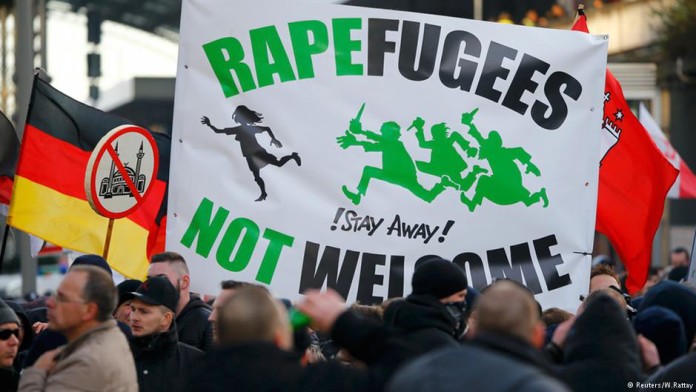Cologne police have said the number of women coming forward with complaints that they were assaulted on New Year’s Eve has risen to 379. A large minority of the reported crimes were said to be of a sexual nature.
Police said on Saturday that the number of cases reported to them had reached 379, about 40 percent of which involved allegations of sexual offences.
“Those in focus of criminal police investigations are mostly people from North African countries. The majority of them are asylum seekers and people who are in Germany illegally,” police said.
“The investigation into if, and how widely, these people were involved in concrete criminal activity on New Year’s Eve is ongoing.”
Cologne’s police chief Wolfgang Albers was suspended on Friday amid mounting criticism of his force’s handling of the incidents, and for being slow to release information.
Police identify 31 in Cologne violence
Witnesses at Cologne’s main train station and Cathedral on Saturday described women being groped as well as subjected to lewd insults and robbery.
The reports have fuelled criticism of Chancellor Angela Merkel’s open door policy on refugees and migrants, which have seen some 1.1 million new asylum seekers registered last year alone.
Merkel’s Christian Democrats (CDU) on Saturday made expediting deportation for asylum seekers who commit crimes an important facet of their new 10-point plan for the nation’s future.
The events have shocked Germany and prompted a series of protests for better security and respect for the rights of women.
CDU seeks to remove legal hurdles
Meeting in the western city of Mainz, the CDU’s draft plan includes a new law that would strip refugees of asylum status after committing a single crime.
The proposals also include speeding up the deportation process for migrants convicted of crimes, even with a suspended sentence, bypassing old laws that can slow down the process and allow the individual to remain in Germany.
Besides laws, the party’s “Mainzer Erklärung” (Mainz Declaration) calls for increased security at hotspots of criminality like the Cologne train station, where many of the assaults took place. The proposed measures include more video cameras and random checks on individuals by security personnel.
After months of insisting that the solution to the refugee crisis must come from a higher level, the CDU’s paper calls for a clear reduction in the number of migrants entering the country. It also rejects the suggestion from Bavarian sister party, the CSU, to construct a fence on the border with Austria. Instead the Mainz Declaration suggests seeking better security at the European Union’s outer borders.
OPINION: Groping incidents in Cologne exacerbate EU refugee crisis
The violent New Year’s Eve attacks in Cologne are grist to the mill for EU hardliners. Now, Brussels will be even more inhospitable towards Angela Merkel’s refugee policies, says DW’s Bernd Riegert.
Until New Year’s Eve in Cologne, consensus on European refugee policy seemed very unlikely. Now, in the wake of massive attacks against women by a large horde of men, a large number of whom were asylum seekers, and compounded by the flagrant inability of the police to do anything about the attacks, agreement on a reasonable plan for distributing refugees throughout the EU has become entirely impossible.
Reactions to the “Sex-Mob” in Cologne, especially those voiced in Eastern Europe, left no room for interpretation. The upshot of statements from Poland, the Czech Republic, Hungary and Slovakia: Refugees, especially Muslims, are dangerous. We have been saying that all along, but “Multi-Culti” Chancellor Angela Merkel didn’t want to hear it.
Slovakia spearheads the movement against Merkel
The chancellor can now forget her call for the longterm regulation of distributing refugees across Europe in an equitable fashion rather than on a volunteer basis. Slovakian Prime Minister Robert Fico does not want to allow Muslim refugees into his country. He seeks to defend against the forced distribution of refugees with every means necessary. He has already filed a complaint against quotas with the European Court of Justice (ECJ) in Luxembourg. The offences in Cologne, Hamburg, Stuttgart, and now Helsinki, have given Fico all the arguments he needs.
The Czech president, the new ultra-conservative Polish government, the Hungarian prime minister and others in Eastern and Southern Europe will agree with Fico wholeheartedly. And not only them, xenophobic right-wing populist Geert Wilders of the Netherlands has damned EU asylum policy lock, stock and barrel. Dutch Prime Minister Mark Rutte, currently President of the EU Council of Ministers, is under increasing pressure. Similar scenarios are playing out in other countries as well: In Denmark, Sweden, Finland, and now also in Germany, pressure is mounting on ruling governments.
Cologne is even being greedily cited beyond Europe’s shores: The Republican presidential candidate Donald Trump did not hesitate to use the incident for his own political gain. “Germany is going through massive attacks to its people by the migrants allowed to enter the country,” tweeted Trump, who wants to seal the USA’s borders.
Domestic pressure on Merkel
The right-wing populist party Alternative for Germany (AfD) and other groups demonstrating against the Islamization of Europe now seem to have the upper hand. The number of anti-immigrant attacks against asylum centers has never been higher in Germany. As a result, the chancellor is under increasing pressure domestically – and now, in the aftershock of Cologne, it seems that her plan for a common European refugee policy has been dealt a fatal blow.
The concept of distributing large influxes of people from Syria, Afghanistan, Iraq, Eritrea and North Africa throughout the EU depends greatly on the rules of the Schengen area. Without an orderly distribution, initial entry point states, like Greece and Italy, will simply continue to flag through refugees. And no country along the Balkan route will stop or detain them. So people will continue to stream into Germany. The “decisive” reduction in the number of immigrants that Chancellor Merkel promised members of her unruly Bavarian sister party, the Christian Social Union (CSU), will not happen. She can no longer count on European solidarity.
Merkel now has the majority of the EU against her
Robert Fico will no doubt stick to his hard line at least until March, when he hopes to be reconfirmed as head of government in upcoming national elections. And, as fate would have it, Fico would then take over the Presidency of the EU Council of Ministers in July. In that position, he will be tasked with finding compromise on European refugee and border security policy.
That will, of course, be a non-starter, as Slovakia is currently suing the majority of EU member states over that same policy. Meanwhile, many heads of state and government think that the German chancellor’s stance in the refugee crisis is misguided. Most likely she will have to change it, or step down.
The shocking events in Cologne have made the already difficult situation within the EU utterly untenable. They could also be the beginning of the end for Europe’s once so powerful Angela Merkel.
-DW.COM













